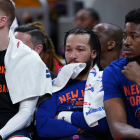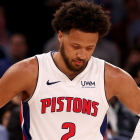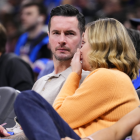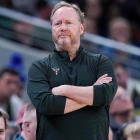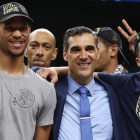 |
| Andre Drummond: shielding one's eyes is important with the Pistons. (Getty Images) |
Over the next month, CBSSports.com's Eye On Basketball will take a team-by-team look at the 2012 NBA offseason. Next up: the Detroit Pistons. You can find our offseason reports here.
I. How they finished 2012: The good news: there weren't any reports of locker room mutinies and the franchise wasn't contracted by the NBA. The bad news: they missed the playoffs for the third straight season, they failed to crack .500 for the fourth year in a row, they had the second-worst offensive efficiency and sixth-worst defensive efficiency in the league, they played at a super slow pace but still committed the third-most turnovers per possession, and they finished second-to-last in the league in home attendance.
In truth, it could have been worse. The Pistons did manage to beat out the Cleveland Cavaliers for fourth place in the Central Division by four games in the shortened season (although a full season of good health from Kyrie Irving could have closed that gap). Unfortunately, the Cavaliers have two things the Pistons lack: a franchise player and hope. Detroit just isn't a compelling collection of players no matter how hard you stare.
Other than getting big-time minutes for rookie guard Brandon Knight (12.8 points and 3.8 assists in 32.3 minutes per game, including 60 starts) and seeing increased production from talented big man Greg Monroe (15.4 points and 9.7 rebounds in his sophomore season) there was a lot more to hate about this season than there was to love.
II. Needs entering the offseason: The Pistons' biggest need, for years now, is some semblance of a plan. Detroit's nonsensical roster moves were easier to write off when the franchise was in the midst of an ownership change, but the tire-spinning has continued unabated, even with new owner Tom Gores fully in charge.
The two biggest, most obvious targets of frustration are Detroit's two big free agency hauls from 2009: Ben Gordon and Charlie Villanueva. Both players vastly under-performed their big-dollar contracts and it made sense for the Pistons to move (or waive) both this summer to begin a new chapter.
Aside from that duo, the Pistons entered the offseason needing help virtually everywhere. They needed a No. 1 franchise player, as Monroe seems better suited to be a No. 2 guy. They needed more team-first players and better locker room leaders. They needed frontline help for Monroe. They needed better positional balance across their roster (moving a few small forwards for a pure point guard and a wing defender would have been good).
More than anything, they needed to slash-and-burn their roster to the ground, dumping as much salary as possible while bottoming out in 2012-13 and collecting as many extra draft picks as possible along the way.
III. The Draft: Detroit, sitting in the No. 9 spot, gambled on the 2012 class's biggest high-risk, high-reward player: UConn center Andre Drummond. A 19-year-old 7-footer who didn't meet high expectations during his sole season at UConn, Drummond figures to get plenty of minutes to learn on the job in Detroit. He addresses a clear need for the Pistons -- frontcourt depth -- and also possesses the potential to one day be a franchise-type center. Of course, tons of polishing and development is needed for him to get there. Does Detroit have the personnel, patience and stability necessary to get him there? Who knows.
In the second round, the Pistons added Kim English, a defense and 3-point shooting two guard, and Khris Middleton, yet another small forward. Detroit will also bring in last year's second-round pick, Kyle Singler, after he spent last season playing professionally in Spain. Yes, Singler is yet another small forward. English fills a need; the other two add to the as-yet-uncleared redundancy pile on the wing.
In terms of wins and losses, nothing the Pistons accomplished in the Draft will make an immediate impact. That's to be expected for a team picking outside the top-5 but it's still discouraging for a fanbase that's ready to get back on the upswing.
IV. Free Agency:
If the Pistons didn't meaningfully improve in the draft, they took a big-time loss when it comes to free agency and trades.
Yes, Detroit finally admitted its mistake on Gordon, shipping him and the two years remaining on his deal to the Charlotte Bobcats in exchange for forward Corey Maggette, who comes off the books next summer. Of course, to obtain the added future flexibility, the Pistons had to compound their original error in signing him by surrending a future first-round pick to the Bobcats. Even taking back Maggette made little sense, as he missed much of last season due to injury and the Pistons already had more small forwards than they can play without him. This was a classic "undo a mistake by making another one" sequence of events, a hallmark of poorly-managed NBA teams.
As bad as that action was, the inaction when it came to Villanueva was worse. Really, the Pistons should have used the amnesty clause on him in December 2011, at the first chance they got, and then again this summer. Instead, they elected to retain him, his $8.1 million contract, his inefficient offense, nonexistent defense, terrible shot selection and grating personality. Wonderful.
Aside from the Gordon trade, there wasn't a single move of note all summer for a team that badly, badly, badly needed a shake-up. Not one! Detroit signed Ukranian center Slava Kravtsov, who becomes the Pistons' fifth rookie on the roster. Other than that, veterans Tayshaun Prince, Rodney Stuckey, Jason Maxiell and Will Bynum were all retained. Austin Daye remains too, still lost in the shuffle. At some point, the Pistons will have no choice but to consolidate and move out a few of their small forwards, clearing the log jam. It should happen by the trade deadline, but you can never be sure with this team.
The bright side here is that with a few minor moves (trading Prince for an expiring contract, allowing Maggette, Maxiell and Bynum to expire after this season, and finally using the amnesty clause on Villanueva to dump the last year of his deal) the Pistons could have loads and loads of salary cap room next summer. And, as long as they miss the playoffs, they will get to keep their first-round pick rather than convey it to the Bobcats, so there should be another quality young player coming aboard. Of course, that scenario opens up the possibility for another round of ill-advised free agency spending a la 2009. That's a scary thought, but at least it's better than where the Pistons have been the last three seasons.
V. Overall grade and accomplishments: D
The Pistons did not improve their roster in any meaningful way, they sacrificed a big-time asset to get out of the final season of Gordon's contract, they made an imbalanced roster even more imbalanced, and they didn't cut ties with Villanueva, a no-brainer decision for a team looking to build around its younger players.
Why wasn't this an "F"? Both Drummond (despite his obvious risks) and English filled clear needs and no new big contract mistakes were made. Counting those as victories is an incredibly low standard, but that's how bad things have gotten in Motown.
The Pistons figure to be awful once again this year. If they aren't awful, it will be a big disappointment, as somehow sneaking into the No. 8 seed would be the definition of false hope. This season will be a success if the Pistons start slow, gut a veteran or two from the roster at the trade deadline, tank to a top-5 pick, and then put together a solid plan to hit the ground running in free agency next summer. Recent history and the franchise's insistence on working hard to be awful rather than giving up and being horrendous tells me those chips won't fall perfectly into place.












